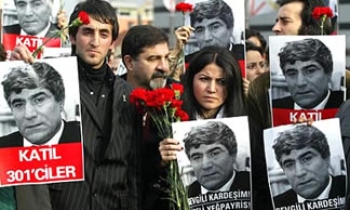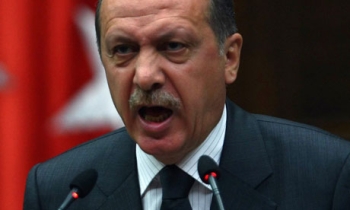TALLINN, Estonia (UPI) -- Even as many Russian commentators continue to speculate about who is behind Muslim protests against the caricatures of the Prophet Mohammed, some Russian analysts are beginning to consider the broader issues of whether and how these events may shift the positions many countries have on other issues.
Virtually all Moscow commentaries suggest that the dispute by putting Europe and the Muslim world at odds gives Washington an important 'propaganda victory' in the U.S.-led war on terrorism. Indeed, some Russian writers say these outbursts will make it easier for the United States to launch an attack on Iran (See the web site: islam.ru/pressclub/smi/permissiveness/).
But perhaps the most intriguing of these discussions now feature suggestions that the shifts in Europe concerning Islam may help Moscow as well, not only reducing public support for criticism of Russia`s prosecution of the war in Chechnya but even opening the way for Moscow to launch an ideological counter-attack on a broader front as well.
In a commentary published in 'Izvestiya' Feb. 8, Maksim Yusin notes that the newspapers in Europe that have printed the caricatures Muslims object to are 'in the main the left, liberal' outlets that up to now have been the primary advocates of '`those struggling for the freedom of Chechnya`' (See web site: main.izvestia.ru/world/08-02-06/article 3069425).
Now, these very papers, Yusin continues, must deal with the reality that they themselves have 'a new enemy' in Shamil Basayev, the Chechen militant most of them have been 'reluctant even to call a terrorist' but who is currently demanding 'revenge' to be inflicted on those who have 'offended the Prophet.'
That creates a situation, the 'Izvestiya' writer says, in which these papers are likely to be forced to reconsider their position on Chechnya and thus become ever less likely to speak out on behalf of the Chechens, a shift that will affect public and political opinion across the continent and lead to a reduction in European criticism of Moscow.
At the same time and in the same vein, Sergei Mironov, the speaker of Russia`s Federation Council, the upper house of the Russian parliament, said he backed calls for Moscow`s representatives at the Parliamentary Assembly of the Council of Europe to demand that European countries where the caricatures have been published 'apologize' to Muslims.
That is only fair, he suggested, given that 'we [in the Russian Federation] have been asked [in the words of one recent PACE resolution] to apologize for communism and for the Soviet Union which no longer exists but which defeated fascism' when that totalitarian system threatened Europe.
Given the reluctance of Europeans to apologize in the current situation, the Federation Council speaker argued, their media and political leaders may as a result be less inclined than they have been in the past to demand that others -- in the first instance, the Russian Federation -- do so.
The psychological dilemma that many Europeans now find themselves in and that people in Moscow like Yusin and Mironov hope to exploit is very real, but there are at least three compelling reasons why they may be exaggerating its impact on the future action of European leaders.
First, Moscow`s man in Chechnya, Ramzan Kadyrov, has in the words of 'Moskovskiye novosti' on Friday 'unilaterally broken relations' with Denmark over the caricature issue by demanding that Danish organizations cease their activities in his republic. At a minimum, that muddies the waters of the issue Moscow may hope to exploit.
Second, at least so far, most European news outlets have defended their actions in the caricature dispute in terms of international standards of freedom and human rights, the very standards they routinely invoke in calling for an end to the use of force in Chechnya and for a political solution there.
And third, Russian President Vladimir Putin`s own statements on the caricature issue, statements in which he has argued that both those who published these drawings of the Prophet and many of those who are protesting them, are hardly likely to make him a poster child for the media freedom European outlets are most concerned about.
Consequently, those who argue that Moscow can exploit the caricature crisis to reduce the volume of European criticism about Chechnya face an uphill battle in winning their case. But the fact that some in Moscow believe that they can make use of this dispute in this way almost certainly means that Russian diplomatists will try.
(Paul Goble teaches at the EuroCollege of the University of Tartu in Estonia.)









